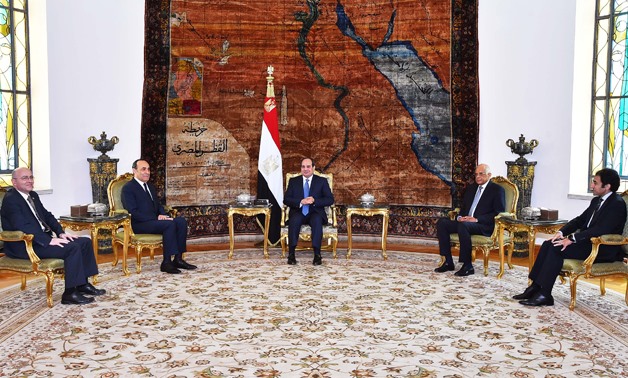
President Sisi meets (C) with Speaker of the Moroccan House of Representatives Al-Habib Al-Malki (the second from left)- press photo
CAIRO – 5 April 2018: Cairo and Rabat are looking forward to strengthening economic ties, as both aim to benefit from each country’s successful experiences in different fields.
Speaker of the Moroccan House of Representatives Al-Habib Al-Malki paid a visit to Cairo on Tuesday, where he met with President Abdel Fatah al-Sisi, Prime Minister Sherif Ismail, Foreign Minister Sameh Shoukry and Egyptian Parliament Speaker Ali Abdul Aal.
Besides discussing coordination on regional issues, including the Libyan crisis and countering terrorism, ways to nurture bilateral investments dominated the table of discussions.
Morocco’s successful experience in the auto industry topped areas of cooperation, in light of the importance of this industry in supporting the economy.
Malki further highlighted a wide range of opportunities to increase the exports of the two countries through benefiting from the signed free trade agreements, which will open new markets to both states, helping to achieve prosperity and the common interests of their peoples.
For his part, Prime Minister Sherif Ismail spoke about providing Egyptian expertise in the field of banking services, as well as cooperation in the fields of tourism and the export of phosphate fertilizers.
Both officials pointed to the need to strengthen tripartite cooperation between Egypt, Morocco and sub-Saharan Africa, and to take advantage of the benefits of free trade between the member states of the Agadir and COMESA agreements.
“Egypt is looking forward to holding meetings between officials in the industry and banking sectors in Egypt and Moroccan businessmen, to talk appropriate proposals for increasing cooperation,” Ismail said on Wednesday during his meeting with Malki.
Remarkable progress has been witnessed in the bilateral economic relations between Egypt and Morocco over the past years. Trade volume rose from $475 million in 2013 to $680 million in 2016. Egyptian exports to Morocco constitute a total of LE 325 million ($18.37 million) of the trade balance, concentrated in different products, including chemical products, fertilizers, medical industries and textiles.
Soothing after tensions
Relations between both North African states have soured since 2015, when Moroccan state-run TV aired reports that misrepresented Egypt’s leadership.
The escalation in tensions was cited by some observers as due to Cairo’s silence on the close relations between some Egyptian parties and the separatist Polisario Front.
Moroccan media outlets criticized Egypt for allowing a delegation from Polisario to participate in the joint Arab-African parliamentary conference in Sharm el-Sheikh in 2016.
The Polisario Front organization aims to end Morocco’s presence in the Western Sahara, which is a disputed territory claimed by both parties. The Western Sahara is listed by the United Nations as a non-self-governing territory. Although the Polisario Front is considered a legitimate representative of the Sahrawi people by the United Nations, it is outlawed in areas that fall under Moroccan control.
In 2016, King Mohammed VI of Morocco received Egypt's Foreign Minister Sameh Shoukry, who paid a short visit to ease the tensions witnessed between both countries.
Signs of soothing the soured relations appeared in diplomatic statements from both sides, ensuring “good relations” and continuous coordination in fighting terrorism.
Last year, an Egyptian-Moroccan working group was formed to promote bilateral economic cooperation in a number of specific sectors, as well as to address challenges hindering the flow of trade between Egypt and Morocco.
Weeks after he was assigned to the position of ambassador to Morocco, Ashraf Ibrahim stated in an interview with Moroccan news website Hespress in February 2018 that what has been witnessed between both states was “just a misunderstanding” and not tensions.
Ibrahim stressed that “Egypt is committed to territorial integrity and to supporting the international solution to the Sahara issue, and to the Moroccan project, which is self-government.”
During his current visit to Cairo, Malki delivered a cable of congratulations from the Moroccan king to President Sisi for the latter’s victory in the 2018 presidential election.
Egypt and Morocco are members of a number of international organizations, including the Arab League, African Union, GAFTA, Non-Aligned Movement and the Organization of Islamic Cooperation.


Comments
Leave a Comment